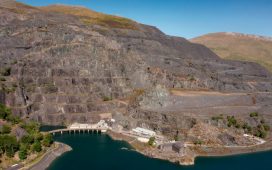A federal judge has upheld the Biden administration’s approval of the Willow oil-drilling project in a remote part of northern Alaska in a move that environmental groups warned will have “tragic consequences” for the Arctic.
On Thursday, the US district court judge Sharon Gleason rejected requests by a grassroots Iñupiat group and environmentalists to undo the approval for the project in the federally designated National Petroleum Reserve-Alaska.
Gleason wrote that the company behind the project, ConocoPhillips, has the right to develop its oil and gas leases in the reserve “subject to reasonable restrictions and mitigation measures imposed by the federal government”. She added that the alternatives analyzed by the US Bureau of Land Management (BLM) were consistent with the policy objectives of the petroleum reserve and the stated purpose and need of the Willow project.
Environmental organizations have accused the president of backpedaling on his pledge to combat climate crisis. The groups that sued over the project raised concerns about planet-warming greenhouse gas emissions from Willow and argued that federal agencies failed to consider how increased emissions from the project could affect species such as the polar bear, Arctic ringed seals and bearded seals, which rely on ice and are already experiencing disruptions due to climate crisis.
Erik Grafe, an attorney with Earthjustice, who was involved in one of the cases, called the ruling disappointing but said “we are entirely confident in our claims, and are considering all legal options including an appeal to the higher court”. The judge’s decision can be appealed.
Bridget Psarianos, an attorney with Trustees for Alaska, which represents Sovereign Inupiat for a Living Arctic and several environmental groups in the other lawsuit, called Gleason’s decision “bad news not just for our clients but for anyone who cares about the climate and future generations”.
Hallie Templeton, legal director at Friends of the Earth, said the decision would have “tragic consequences for Arctic communities, wildlife, and our planet as a whole. But the fight is far from over. We maintain confidence in our legal claims that Interior has unlawfully ignored the significant environmental harms stemming from Willow. We won’t stop until this climate disaster of a project is dead once and for all.”
The project has widespread political support in Alaska. But the administration’s action has also alienated and outraged some supporters, particularly young activists who launched a TikTok campaign to oppose the project ahead of its approval in March.

ConocoPhillips Alaska had proposed five drilling sites, but the Bureau of Land Management approved three, which it said would include up to 199 total wells. The project could produce up to 180,000 barrels of oil a day at its peak. Using that oil would produce the equivalent of at least 263m tons (239m metric tons) of greenhouse gas emissions over Willow’s projected 30-year life.
The administration has defended its climate record and Deb Haaland, the interior secretary, earlier this year called Willow “a very long and complicated and difficult decision to make”, noting that ConocoPhillips Alaska has long held leases in the region and that regulators tried to balance drilling rights with a project that was narrower in scope.
The project has been mired in litigation since years.
A prior authorization of Willow, issued in 2020 during the Trump administration, called for allowing ConocoPhillips to establish up to three drill sites, with the potential for two more proposed by the company to be considered later.
But Gleason set that aside in 2021 after finding that the federal review underpinning the decision was flawed and did not include mitigation measures for polar bears. The ruling led to a new environmental analysis, followed by the Biden administration’s greenlight in March for what justice department attorneys had said was a scaled-back version that resolved the concerns raised by Gleason.
Many Alaska Native leaders on the North Slope and groups with ties to the region have argued that Willow is economically vital for their communities. Mike Dunleavy, Alaska’s Republican governor, the state’s bipartisan congressional delegation and labor unions have touted Willow as a job creator in a state where major existing oil fields are aging and production is a small fraction of what it once was.
“Today’s ruling gives us hope for our collective future on the North Slope and in Alaska,” said Nagruk Harcharek, president of the group Voice of Arctic Iñupiat, whose members include leaders from across much of the North Slope region. “Going forward, we hope that key decision makers in the Biden administration and in Congress listen to the voices of those who know these lands better than anyone else: the North Slope Iñupiat.”
Some Alaska Native leaders in the community nearest the project, Nuiqsut, have expressed concerns about impacts to their subsistence lifestyles and have said their concerns were ignored.
The Associated Press contributed reporting











